As mentioned in the previous post, I collect quotations at my Wish I’d Said That (WIST) site. Here are some quotations I’ve picked up over the years on the presidency, and leadership, in consideration of what I think of as being a President, of being presidential.
It will not surprise you to discover I find a tremendous contrast between Donald Trump and these ideals. To me it’s a reminder of what we’ve lost the last four years, and have an opportunity to regain.
Links go to the original quotation on WIST, which may have additional sourcing information or notes.
Every man is said to have his peculiar ambition. Whether it be true or not, I can say for one that I have no other so great as that of being truly esteemed of my fellow men, by rendering myself worthy of their esteem.
¶ Abraham Lincoln (1809-1865) American lawyer, politician, US President (1861-65)
“To the People of Sangamo County,” speech running for Illinois state legislature (9 Mar 1832)
A politician, for example, is a man who thinks of the next election; while the statesman thinks of the next generation.
¶ James Freeman Clarke (1810-1888) American theologian and author
“Wanted, a Statesman!”, Old and New Magazine (Dec 1870)
Although in our country the Chief Magistrate must almost of necessity be chosen by a party and stand pledged to its principles and measures, yet in his official action he should not be the President of a part only, but of the whole people of the United States. While he executes the laws with an impartial hand, shrinks from no proper responsibility, and faithfully carries out in the executive department of the Government the principles and policy of those who have chosen him, he should not be unmindful that our fellow-citizens who have differed with him in opinion are entitled to the full and free exercise of their opinions and judgments, and that the rights of all are entitled to respect and regard.
¶ James K. Polk (1795-1849) American lawyer, politician, US President (1845-1849)
Inaugural Address (4 Mar 1845)
You cannot be a leader, and ask other people to follow you, unless you know how to follow, too.
¶ Sam Rayburn (1882-1961) American lawyer and politician
Quoted in The Leadership of Speaker Sam Rayburn, Collected Tributes of His Congressional Colleagues, House Doc. 87-247 (1961)
For of those to whom much is given, much is required. And when at some future date the high court of history sits in judgment on each of us — recording whether in our brief span of service we fulfilled our responsibilities to the state — our success or failure, in whatever office we hold, will be measured by the answers to four questions:
First, were we truly men of courage — with the courage to stand up to one’s enemies — and the courage to stand up, when necessary, to one’s associates — the courage to resist public pressure, as well as private greed?
Secondly, were we truly men of judgment — with perceptive judgment of the future as well as the past — of our mistakes as well as the mistakes of others — with enough wisdom to know what we did not know and enough candor to admit it.
Third, were we truly men of integrity — men who never ran out on either the principles in which we believed or the men who believed in us — men whom neither financial gain nor political ambition could ever divert from the fulfillment of our sacred trust?
Finally, were we truly men of dedication — with an honor mortgaged to no single individual or group, and comprised of no private obligation or aim, but devoted solely to serving the public good and the national interest?
Courage — judgment — integrity — dedication — these are the historic qualities … which, with God’s help … will characterize our Government’s conduct in the four stormy years that lie ahead.
¶ John Fitzgerald Kennedy (1917-1963) US President (1961-63)
Address to the Massachusetts legislature (9 Jan 1961)
It is part of the price of leadership of this great and free nation to be the target of clever satirists. You have given the gift of laughter to our people. May we never grow so somber or self-important that we fail to appreciate the humor in our lives.
¶ Lyndon B. Johnson (1908-1973) American politician, educator, US President (1963-69)
Letter to the Smothers Brothers (Nov 1968)
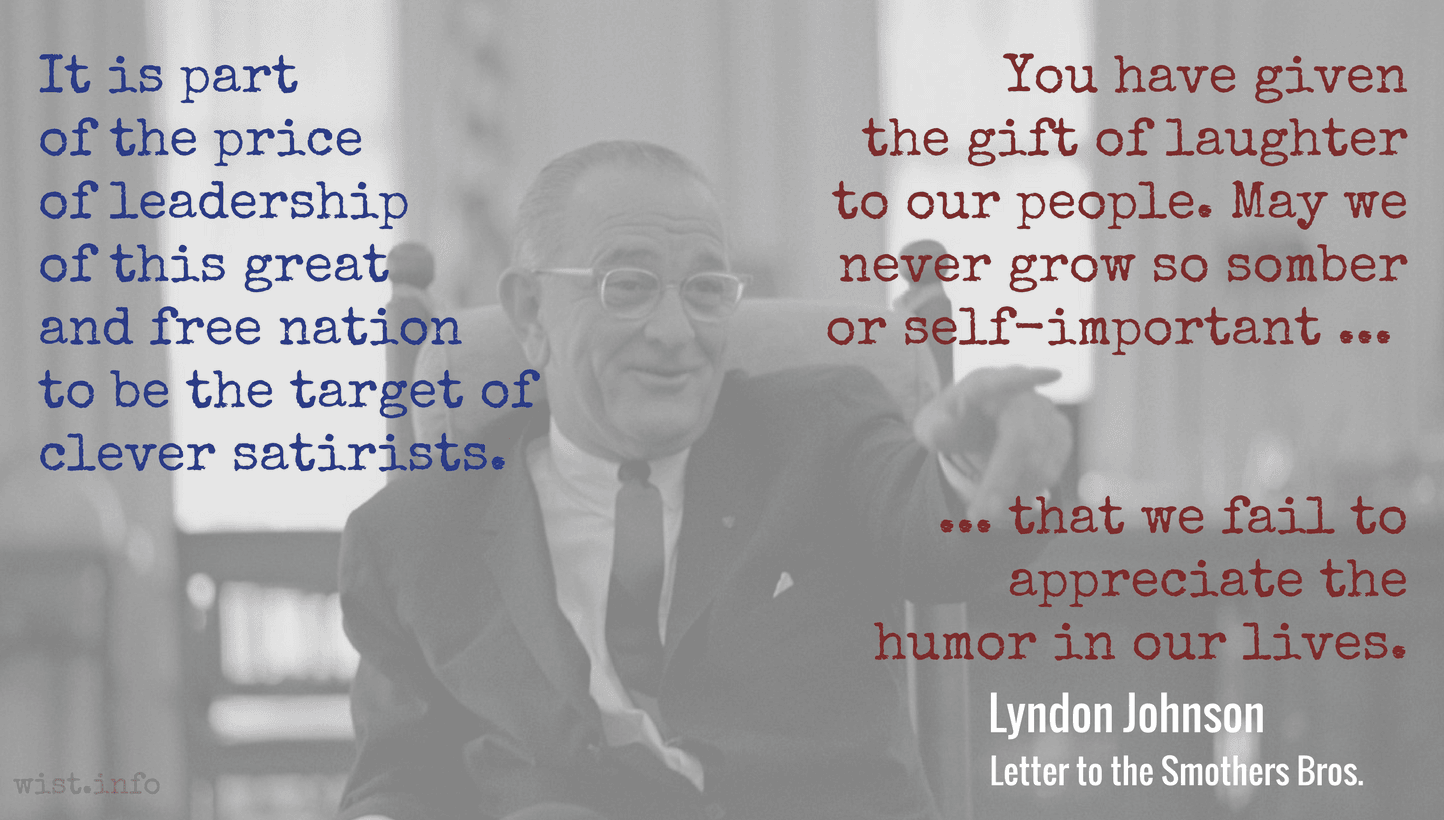
The aim of every political constitution is, or ought to be, first to obtain for rulers men who possess most wisdom to discern, and most virtue to pursue, the common good of the society; and in the next place, to take the most effectual precautions for keeping them virtuous whilst they continue to hold their public trust.
¶ James Madison (1751-1836) American statesman, political theorist, US President (1809-17)
The Federalist #57 (19 Feb 1788)
Dishonor in public life has a double poison. When people are dishonorable in private business, they injure only those with whom they deal or their own chances in the net world. When there is a lack of honor in Government, the morals of the whole people are poisoned.
¶ Herbert Hoover (1874-1964) American engineer, bureaucrat, President of the US (1928-32)
Address, Des Moines, Iowa (30 Aug 1951)
Ultimately, a genuine leader is not a searcher for consensus, but a molder of consensus.
¶ Martin Luther King, Jr. (1929-1968) American clergyman, civil rights leader, orator
Speech, Labor Leadership Assembly for Peace (Nov 1967)
PRESIDENT, n. The leading figure in a small group of men of whom — and of whom only — it is positively known that immense numbers of their countrymen did not want any of them for President.
¶ Ambrose Bierce (1842-1914?) American writer and journalist
The Cynic’s Word Book (1906)
The measure of leadership is not the quality of the head, but the tone of the body. The signs of outstanding leadership appear primarily among the followers.
¶ Max De Pree (b. 1924) American businessman and writer
Leadership Is An Art (1987)
Your public servants serve you right.
¶ Adlai Stevenson (1900-1965) American diplomat, statesman
Speech, Los Angeles (11 Sep 1952)
The best foreign policy is to live our daily lives in honesty, decency, and integrity; at home, making our own land a more fitting habitation for free men; and abroad, joining with those of like mind and heart, to make of the world a place where all men can dwell in peace.
¶ Dwight David Eisenhower (1890-1969) American general, US President (1953-61)
Inaugural Gabriel Silver lecture, Columbia University (23 Mar 1950)
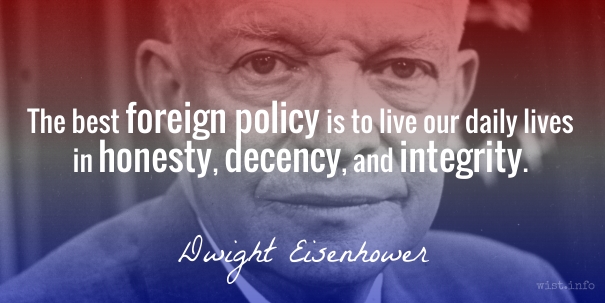
The legislative job of the President is especially important to the people who have no special representatives to plead their cause before Congress — and that includes the great majority. The President is the only lobbyist that 150 million Americans have. The other 20 million are able to employ people to represent them — and that’s all right, it’s the exercise of the right of petition — but someone has to look after the interests of the 150 million that are left.
¶ Harry S Truman (1884-1972) US President (1945-1953)
Speech, Press and Union Club, San Francisco (25 Oct 1956)
To serve the Public faithfully, and at the same time please it entirely, is impracticable.
¶ Benjamin Franklin (1706-1790) American statesman, scientist, philosopher
Poor Richard’s Almanack (Oct 1758)
The politician in my country seeks votes, affection and respect, in that order…. With few notable exceptions, they are simply men who want to be loved.
¶ Edward R. Murrow (1908-1965) American journalist
Address at London Guildhall (19 Oct 1959)
I believe that the public temper is such that the voters of the land are prepared to support the party which gives the best promise of administering the government in the honest, simple, and plain manner which is consistent with its character and purposes. They have learned that mystery and concealment in the management of their affairs cover tricks and betrayal. The statesmanship they require consists in honesty and frugality, a prompt response to the needs of the people as they arise, and a vigilant protection of all their varied interests.
¶ Grover Cleveland (1837–1908) American President (1885–1889, 1893–1897)
Letter accepting Democratic nomination for President (8 Aug 1884)
When I ran for Presidency of the United States, I knew that this country faced serious challenges, but I could not realize — nor could any man realize who does not bear the burdens of this — how heavy and constant would be those burdens.
¶ John F. Kennedy (1917-1963) US President (1961-63)
“Radio and TV Report to the American People on the Berlin Crisis” (25 Jul 1961)
The first rule of democracy is to distrust all leaders who begin to believe their own publicity.
¶ Arthur M. Schlesinger, Jr. (1917-2007) American historian, author, social critic
“On Heroic Leadership,” Encounter (Dec 1960)
I pledge you, I pledge myself, to a new deal for the American people. Let us all here assembled constitute ourselves prophets of a new order of competence and of courage. This is more than a political campaign; it is a call to arms. Give me your help, not to win votes alone, but to win in this crusade to restore America to its own people.
¶ Franklin Delano Roosevelt (1882-1945) US President (1933-1945)
Presidential nomination acceptance speech, Chicago (2 Jul 1932)
Dependability, integrity, the characteristic of never knowingly doing anything wrong, that you would never cheat anyone, that you would give everybody a fair deal. Character is a sort of an all-inclusive thing. If a man has character, everyone has confidence in him. Soldiers must have confidence in their leader.
¶ Omar Bradley (1893-1981) American general
Personal interview with Edgar Puryear (15 Feb 1963)
Quoted in Edgar Puryear, 19 Stars : A Study in Military Character and Leadership (1981).
You have heard the story, haven’t you, about the man who was tarred and feathered and carried out of town on a rail? A man in the crowd asked him how he liked it. His reply was that if it was not for the honor of the thing, he would much rather walk.
¶ Abraham Lincoln (1809-1865) American lawyer, politician, US President (1861-65)
When asked how he enjoyed being President. (Attributed (1861))
Because power corrupts, society’s demands for moral authority and character increase as the importance of the position increases.
¶ John Adams (1735-1826) American lawyer, Founding Father, statesman, US President (1797-1801)
(Attributed)
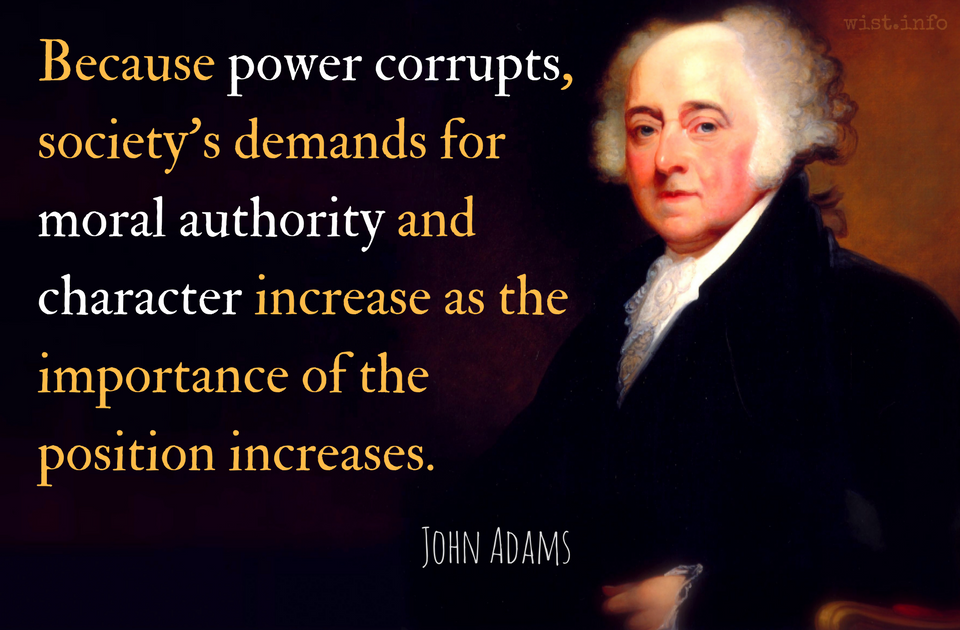
The worst error a president can make is to assume the automatic implementation of his own decisions. In certain respects, having able subordinates aggravates that problem, since strong personalities tend to have strong ideas of their own. Civil government operates by consent, not by command; the President’s task, even within his own branch of government, is not to order but to lead.
¶ Arthur M. Schlesinger, Jr. (1917-2007) American historian, author, social critic
The Age of Roosevelt: The Coming of the New Deal, ch. 33, sec. 3 (1959)
The second office of this government is honorable & easy, the first is but a splendid misery.
¶ Thomas Jefferson (1743-1826) American political philosopher, polymath, statesman, US President (1801-09)
Letter to Elbridge Gerry (13 May 1797)
The task of leadership is not to put greatness into humanity, but to elicit it, for the greatness is already there.
¶ John Buchan (1875-1940) Scottish novelist, poet, and politician; Governor-General of Canada (1935 -1940)
Montrose and Leadership (1930)
All presidents start out to run a crusade, but after a couple of years they find they are running something less heroic and much more intractable: namely, the presidency.
¶ Alistair Cooke (1908-2004) Anglo-American essayist and journalist
Talk About America, ch. 6 (1981)
He serves his party best who serves the country best.
¶ Rutherford B. Hayes (1822-1893) American attorney, soldier, politician, US President (1877-81)
Inaugural address (5 Mar 1877)
The first responsibility of a leader is to define reality. The last is to say thank you. In between the two, the leader must become a servant and a debtor.
¶ Max De Pree (b. 1924) American businessman and writer
Leadership Is An Art (1989)
You can lead an organization through persuasion or formal edict. I have never found the arbitrary use of authority to control an organization either effective or, for that matter, personally interesting. If you cannot persuade your colleagues of the correctness of your position, it is probably worthwhile to rethink your own.
¶ Alan Greenspan (b. 1926) American economist, bureaucrat
“Federal Reserve’s Chairman Blends Eye for Politics with Economic Skills,” New York Times (26 Jul 1990)
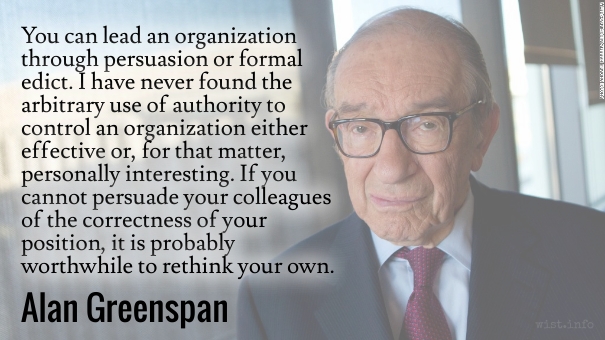
The Presidency is not merely an administrative office. That’s the least of it. It is more than an engineering job, efficient or inefficient. It is pre-eminently a place of moral leadership. All our great Presidents were leaders of thought at times when certain historic ideas in the life of the nation had to be clarified.
¶ Franklin Delano Roosevelt (1882-1945) US President (1933-1945)
In The New York Times Magazine (11 Sep 1932)
If we do not lay out ourselves in the service of mankind whom should we serve?
¶ Abigail Adams (1744-1818) American correspondent, First Lady (1797-1801)
Letter to John Thaxter (29 Sep 1778)
I despise toadies who suck up to their bosses; they are generally the same people who bully their subordinates.
¶ David Ogilvy (1911–1999) British advertising executive
Confessions of an Advertising Man, ch. 1 (1963)
Do you know what makes a leader? It’s the man or woman who can persuade people to do what they ought to do — and which they sometimes don’t do — without being persuaded. They must also have the ability to persuade people to do what they do not want to do and like it.
¶ Harry S Truman (1884-1972) US President (1945-1953)
Speech, Annapolis (24 May 1952)
The President is merely the most important among a large number of public servants. He should be supported or opposed exactly to the degree which is warranted by his good conduct or bad conduct, his efficiency or inefficiency in rendering loyal, able, and disinterested service to the nation as a whole. Therefore it is absolutely necessary that there should be full liberty to tell the truth about his acts, and this means that it is exactly as necessary to blame him when he does wrong as to praise him when he does right. Any other attitude in an American citizen is both base and servile. To announce that there must be no criticism of the President, or that we are to stand by the President, right or wrong, is not only unpatriotic and servile, but is morally treasonable to the American public. Nothing but the truth should be spoken about him or any one else. But it is even more important to tell the truth, pleasant or unpleasant, about him than about any one else.
Theodore Roosevelt (1858-1919) US President (1901-1909)
“Sedition, A Free Press, and Personal Rule,” Kansas City Star (7 May 1918)
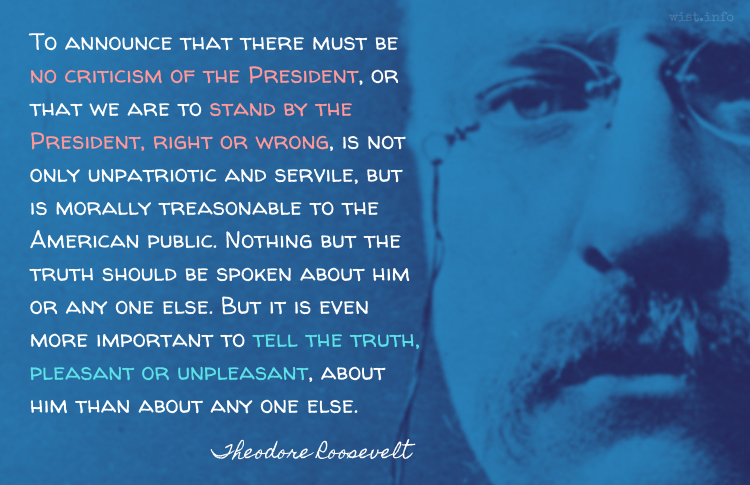
You convey too great a compliment when you say that I have earned the right to the presidential nomination. No man can establish such an obligation upon any part of the American people. My country owes me no debt. It gave me, as it gives every boy and girl, a chance. It gave me schooling, independence of action, opportunity for service and honor. In no other land could a boy from a country village, without inheritance or influential friends, look forward with unbounded hope. My whole life has taught me what America means. I am indebted to my country beyond any human power to repay.
¶ Herbert Hoover (1874-1964) American engineer, bureaucrat, President of the US (1928-32)
Letter to George Moses (14 Jun 1928)
When you get to be President, there are all those things, the honors, the twenty-one gun salutes, all those things. You have to remember it isn’t for you. It’s for the Presidency.
¶ Harry S Truman (1884-1972) US President (1945-1953)
In Merle Miller, Plain Speaking: An Oral Biography of Harry S. Truman, ch. 15 (1973)
Widespread intellectual and moral docility may be convenient for leaders in the short term, but it is suicidal for nations in the long term. One of the criteria for national leadership should therefore be a talent for understanding, encouraging, and making constructive use of vigorous criticism.
¶ Carl Sagan (1934-1996) American scientist and writer
Billions and Billions, ch. 14 “The Common Enemy” (1997)
The intoxication of power rapidly sobers off in the knowledge of its restrictions and under the prompt reminder of an ever-present and not always considerate press, as well as the kindly suggestions that not infrequently come from Congress.
¶ William Howard Taft (1857-1930) US President (1909-13) and Chief Justice (1921-1930)
Speech, Lotus Club (16 Nov 1912)
The leader holds his position purely because he is able to appeal to the conscience and to the reason of those who support him, and the boss holds his position because he appeals to fear of punishment and hope of reward. The leader works in the open, and the boss in covert. The leader leads, and the boss drives.
¶ Theodore Roosevelt (1858-1919) US President (1901-1909)
Speech, Binghamton, New York (24 Oct 1910)
The culture of any organization is shaped by the worst behavior the leader is willing to tolerate.
¶ Steve Gruenert and Todd Whitaker, School Culture Rewired, ch. 3 (2015)
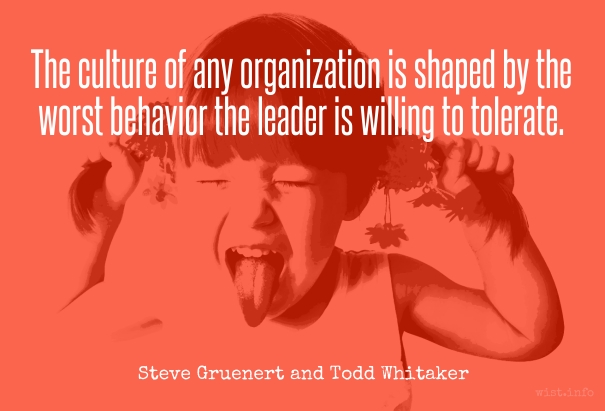
Leadership is a potent combination of strategy and character. But if you must be without one, be without the strategy.
¶ Norman Schwarzkopf (b. 1934) American military leader
(Attributed)
Leadership is solving problems. The day soldiers stop bringing you their problems is the day you have stopped leading them. They have either lost confidence that you can help or concluded you do not care. Either case is a failure of leadership.
¶ Colin Powell (b. 1937) American military leader, Secretary of State
My American Journey, ch. 2 (2003)
I praise loudly, I blame softly.
¶ Catherine II (1762-1796) Russian empress [Catherine the Great]
Letter (23 Aug. 1794)
If you don’t understand that you work for your mislabeled subordinates, then you know nothing of leadership. You know only tyranny.
¶ Dee W. Hock (b. 1929) American businessman
“Unit of One Anniversary Handbook,” Fast Company (28 Feb 1997)
No President should fear public scrutiny of his program. For from that scrutiny comes understanding; and from that understanding comes support or opposition. And both are necessary.
¶ John F. Kennedy (1917-1963) US President (1961-63)
Speech, American Newspaper Publishers Association (27 Apr 1961)
We need leaders not in love with money but in love with justice. Not in love with publicity but in love with humanity.
¶ Martin Luther King, Jr. (1929-1968) American clergyman, civil rights leader, orator
“The Birth of a New Age,” speech, Alpha Phi Alpha banquet, Buffalo (11 Aug 1956)
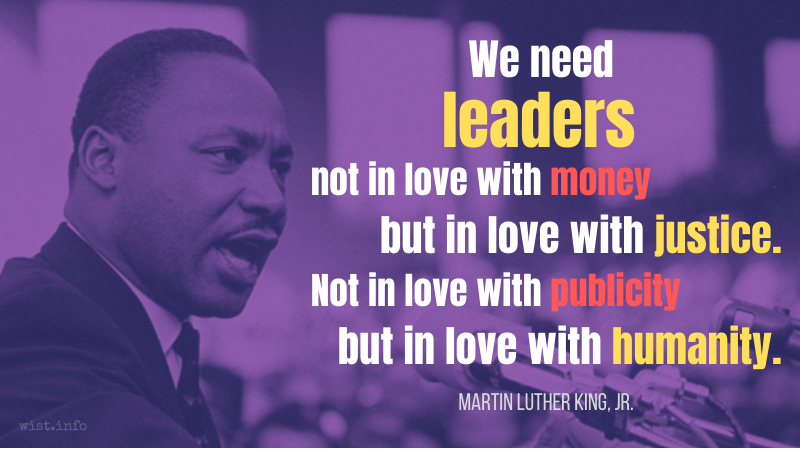
The President must be greater than anyone else, but not better than anyone else. We subject him and his family to close and constant scrutiny and denounce them for things that we ourselves do every day. A Presidential slip of the tongue, a slight error in judgment — social, political, or ethical — can raise a storm of protest. We give the President more work than a man can do, more responsibility than a man should take, more pressure than a man can bear. We abuse him often and rarely praise him. We wear him out, use him up, eat him up. And with all this, Americans have a love for the President that goes beyond loyalty or party nationality; he is ours, and we exercise the right to destroy him.
¶ John Steinbeck (1902-1968) American writer
“America and Americans” (1966)
Divide and rule, the politician cries;
Unite and lead, is watchword of the wise.
¶ Johann Wolfgang von Goethe (1749-1832) German poet, statesman, scientist
Sprüche in Prosa (1819)
The function of leadership is to produce more leaders, not more followers.
¶ Ralph Nader (b. 1934) American attorney, author, lecturer, political activist
Time Leadership Conference, Washington, DC (Sep 1976)
You can judge a leader by the size of the problem he tackles — people nearly always pick a problem their own size, and ignore or leave to others the bigger or smaller ones. The chief executive should be thinking about the long-term changes which will bring growth or decay to different parts of the enterprise, not fussing over day-to-day problems. Other people can cope with the waves, it’s his job to watch the tide.
¶ Antony Jay (b. 1930) English writer, broadcaster, director
Management and Machiavelli: An Inquiry into the Politics of Corporate Life, ch. 17 (1967)
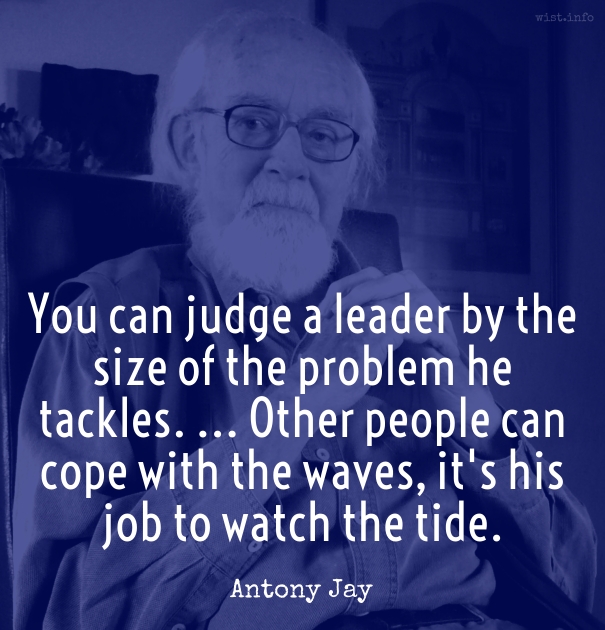
For a man of sensitivity and compassion to exercise great powers in a time of crisis is a grim and agonizing thing.
¶ Richard Hofstadter (1916-1970) American historian and intellectual
The American Political Tradition: And the Men Who Made It, Part 5, ch. 7 (1958)
Referring to Abraham Lincoln and the Civil War.
It is loyalty to great ends, even though forced to combine the small and opposing motives of selfish men to accomplish them; it is the anchored cling to solid principles of duty and action, which knows how to swing with the tide, but is never carried away by it — that we demand in public men, and not sameness of policy, or a conscientious persistency in what is impracticable.
¶ James Russell Lowell (1819-1891) American diplomat, essayist, poet
“Abraham Lincoln” (1864), My Study Windows (1871)
Never hire or promote in your own image. It is foolish to replicate your strength. It is idiotic to replicate your weakness. It is essential to employ, trust, and reward those whose perspective, ability, and judgment are radically different from yours. It is also rare, for it requires uncommon humility, tolerance, and wisdom.
¶ Dee W. Hock (b. 1929) American businessman
In M. Mitchell Waldrop, “Dee Hock on Management,” Fast Company (Oct/Nov 1996)
The supreme quality for leadership is unquestionably integrity. Without it, no real success is possible, no matter whether it is on a section gang, a football field, in an army, or in an office. If a man’s associates find him guilty of phoniness, if they find that he lacks forthright integrity, he will fail. His teachings and actions must square with each other. The first great need, therefore, is integrity and high purpose.
¶ Dwight David Eisenhower (1890-1969) American general, US President (1953-61)
(Attributed)
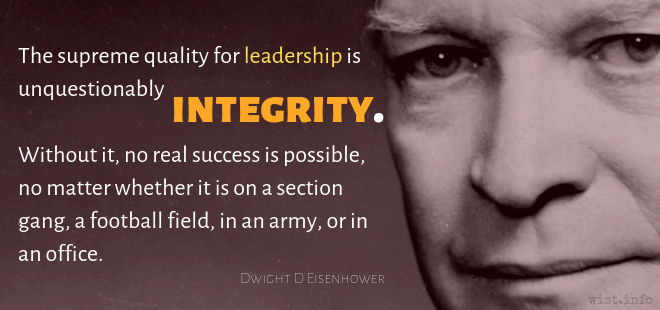
Our loyalty is due entirely to the United States. It is due to the President only and exactly to the degree in which he efficiently serves the United States. It is our duty to support him when he serves the United States well. It is our duty to oppose him when he serves it badly. This is true about Mr. Wilson now and it has been true about all our Presidents in the past. It is our duty at all times to tell the truth about the President and about every one else, save in the cases where to tell the truth at the moment would benefit the public enemy.
¶ Theodore Roosevelt (1858-1919) US President (1901-1909)
Kansas City Star (7 May 1918)
Your position never gives you the right to command. It only imposes on you the duty of so living your life that others can receive your orders without being humiliated.
¶ Dag Hammarskjöld (1905-1961) Swedish diplomat, author, UN Secretary-General (1953-61)
Markings (1955) [tr. Sjoberg & Auden (1964)]
The job of getting people really wanting to do something is the essence of leadership. And one of the things a leader needs occasionally is the inspiration he gets from the people he leads. The old tactical textbooks say that the commander always visits his troops to inspire them to fight. I for one soon discovered that one of the reasons for my visiting the front lines was to get inspiration from the young American soldier. I went back to my job ashamed of my own occasional resentments or discouragements, which I probably — at least I hope I concealed them.
¶ Dwight David Eisenhower (1890-1969) American general, US President (1953-61)
Speech, Republican State Chairmen, Denver (10 Sep 1955)
You can’t do the biggest things in this world unless you handle men; and you can’t handle men if you’re not in sympathy with them; and sympathy begins in humility.
¶ George Horace Lorimer (1867-1937) American journalist, author, magazine editor
Letters from a Self-Made Merchant to His Son (1901)
The high sentiments always win in the end, the leaders who offer blood, toil, tears, and sweat always get more out of their followers than those who offer safety and a good time. When it comes to the pinch, human beings are heroic.
¶ George Orwell (1903-1950) English writer [pseud. of Eric Arthur Blair]
“The Art of Donald McGill” (Sep 1941)
Oh, if there is a man out of hell that suffers more than I do, I pity him.
¶ Abraham Lincoln (1809-1865) American lawyer, politician, US President (1861-65)
(Attributed (1862))
Our trouble is that we do not demand enough of the people who represent us. We are responsible for their activities. … We must spur them to more imagination and enterprise in making a push into the unknown; we must make clear that we intend to have responsible and courageous leadership.
¶ Eleanor Roosevelt (1884-1962) First Lady of the US (1933-45), politician, diplomat, activist
Tomorrow Is Now (1963)
God give us men. The time demands
Strong minds, great hearts, true faith, and willing hands;
Men whom the lust of office does not kill;
Men whom the spoils of office cannot buy;
Men who possess opinions and a will;
Men who have honor; men who will not lie;
Men who can stand before a demagogue
And damn his treacherous flatteries without winking;
Tall men, sun-crowned, who live above the fog
In public duty and in private thinking ….
¶ J. G. Holland (1819-1881) American novelist, poet, editor [Josiah Gilbert Holland; pseud. Timothy Titcomb]
“Wanted” (1872)
